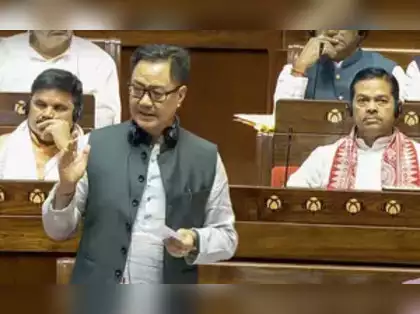Lagatar24 Desk
New Delhi: Minority Affairs Minister Kiren Rijiju robustly defended the Waqf (Amendment) Act in the Lok Sabha today, countering the Opposition’s criticisms by citing several instances of illegal encroachments by Waqf bodies across the country. Rijiju accused a small group of people of capturing Waqf boards and preventing ordinary Muslims from receiving justice.
The Minister referenced multiple inquiry reports and extensive consultations with stakeholders to justify the provisions in the proposed legislation. Highlighting the severity of the issue, Rijiju shared examples from Tamil Nadu and Gujarat.
“In Tiruchirapalli district, Tamil Nadu, a 1,500-year-old Sundareshwar temple was declared Waqf property. A man attempting to sell his land was informed that his entire village had been labeled as Waqf property. Imagine the implications of such a declaration,” Rijiju stated. He also cited the example of Surat, Gujarat, where the Surat Municipal Corporation headquarters was declared Waqf property, questioning the legality of such actions.
Rijiju, who emphasized his respect for all religions, stressed that the issue should not be viewed through a religious lens. “Is the municipal corporation private property? How can it be declared Waqf property?” he questioned, challenging the logic behind such decisions.
The Minister pointed out a 1976 inquiry report that recommended reforms to regulate Waqf boards and referred to the Sachar committee’s suggestions for increased representation in these bodies. He emphasized that the proposed law aims to provide representation for various Muslim communities, including Shia, Sunni, Bohra, and Agakhani, as well as other backward classes. “If one community is dominating others, how can this Parliament allow it?” Rijiju asked.
He further accused the Opposition of supporting a small faction within the Waqf boards, leading to widespread discontent among Muslims. Rijiju assured that the Bill does not infringe on religious freedoms or violate the Constitution. He also noted that the Centre has agreed to send the Bill to a joint parliamentary committee for further scrutiny.
Rijiju revealed that several Opposition leaders had privately admitted that state Waqf boards had become corrupt, but he chose not to disclose their names to protect their political careers.
Earlier, the Opposition criticized the proposed changes in the Waqf (Amendment) Bill, with Congress leader KC Venugopal labeling it “draconian” and an attack on religious freedom and federalism. Samajwadi Party chief Akhilesh Yadav also opposed the inclusion of non-Muslim members on Waqf boards, questioning the need for such a provision.
Defending the legislation, BJP ally JDU’s leader Rajiv Ranjan Singh argued that the Bill is intended to enhance transparency in the functioning of Waqf boards. He countered the Opposition’s claim that the Bill is anti-minority by referencing the 1984 anti-Sikh riots, asking, “Who killed thousands of Sikhs?”






